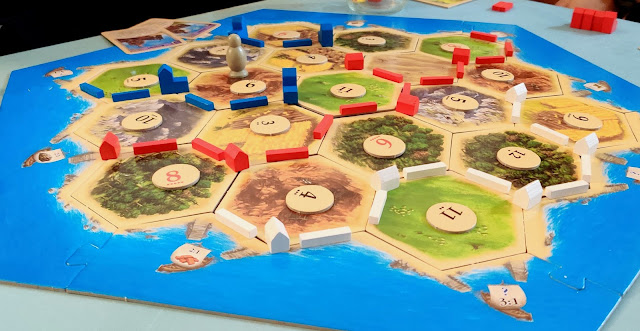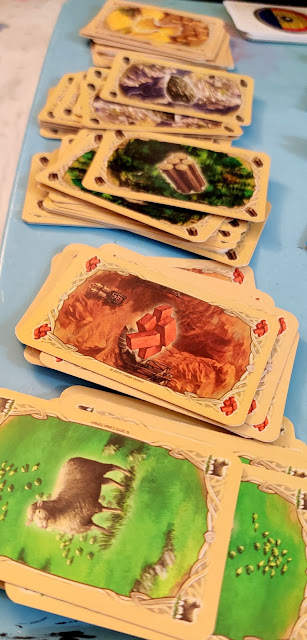Life lessons from Catan
For
those of you into board games, you may have heard of the game, ‘Settlers of
Catan’ or more easily and popularly known as Catan. Launched in 1995 by a
dental technician, Klaus Teuber (he left his job within years of launching
Catan, so popular turned out the game), the game has sold over 40 million
copies worldwide, has been translated into 40 languages, has won every single
award possible worldwide for a board game, has its own World championship, and
has multiple versions including a Star Trek and a Game of Thrones rendition.
Beautifully crafted with honeycomb-like hexagons to create the big rectangular
land of Catan, the objective of the game is simple – the first player to
gain 10 points wins. The unfolding of the game is though, far from simple.
There are multiple ways to get to 10 points, but eventually they all boil down
to gaining four types of resources – food, wood, rocks and bricks – with which
one needs to make roads, build houses and upgrade them to villages, in a way
proclaiming that the settler who expands the most, wins the game. All distended
with randomness galore, starting with the roll of the die. I will not talk any
more of the game – to really understand it, you should definitely play it – its
strategy 101 for sure.
But
game, rules and randomness aside, I found a few life-lessons as well in the
game. Reflecting on the way the game unfolds, I have noticed trends in the winners’
playing styles and these can be interpreted into lessons, not just for the
game, but for everyday life as well. Here are then, a few of my interpretations
of life-lessons from the stimulating Catan.
Lesson
#1 – life will even out between the haves and have-nots
In
the game, players roll two die – the range of outcomes varying from 2 to 12. You
start with 2 houses straddling 4 -6 hexagons each with a number and only get
resources if the die rolls to a number that you have houses own. Needless to
say, there will be many turns when you are left high and dry, and then there
are turns when you hit jackpot. But overall, throughout the game – which often
lasts hours – you will realise that each player gets a fair distribution of his
resources. A statistician will interpret this as the normal distribution of the
outcomes from a pair of die. Likewise, in most cases, life will give you times
of plenty and times of aridity, overall evening out in the long run. Imagine a
cricketer’s stint of scores – there are times when he scores plenty, such are
the weather, ground and often, mental conditions. And then, there are times when
he hits an empty patch – but overall, the opportunities to play, home and abroad,
in fast and slow pitches, against weak and strong teams even out. What you do
with those conditions is up to you but over a long period of time, life is in
itself a great equalizer – like the throw of dice, you will get numbers from 2
-12, some of which will give you plenty, while others will return nothing.
Lesson #2 – despite evening out, we shouldn’t expect your gains and losses to be equal
The
hard part now, is despite the evening out, you cannot expect everyone’s progress
will be equal (How else will there be a winner?) For example, you can get
plenty of resources at the start, which will help you fan out, conquer more territory
and build more houses (eventually there is a multiplicative compounding effect,
so the sooner you expand the easier it is to get more points). Alternately you can
get plenty of resources at the very end, but by then it may be a bit difficult but
never impossible to win the game (I have seen players come back after being absolutely
stalled for rounds to win the game). Normally (pun intended), extremes don’t happen
so all players should get bit by bit throughout the game, but if you sum up,
you will definitely find differences. Well, such is life! You cannot expect the
sun to shine as brightly as the clouds were dark, nature is not a zero-sum game.
In a way, the opportunities in life may be roughly equal, but the timing is also
important – imagine wining a million dollars lottery when you are 20, vs
winning one when you are 50. Well invested, your 20-year old will make more
overall in time than your 50 year old. But the biggest catch here is ‘well-invested’
- opportunities in life are one thing,
what you do with it is totally different. This is where lessons #3 and #4
become really interesting
Lesson #3 – we need to work on our goals, regularly, continuously, making little incremental gains to be able to finally see success
Now this seems obvious, but in reality, perhaps not all of us use and apply this principle in our daily life. I believe no success in any sphere in life is a big-bang event. It doesn’t happen overnight – except perhaps winning a lottery, whose chances are pretty slim. If success is not big- bang, there needs to be little increments regularly, or we’ll never reach the destination. In the game, 10 points don’t come in one round - well, often, multiple rounds are required to get to even one extra point – but on observing the more successful players, I have realised that they try to get something every round - a small road here, a trade there to get a healthy combination, a house finally, but something every round to inch to some development. When nothing works out, players often end up buying random development cards, helping them come back into the game and win itbin many instances. The larger lesson is, we need to do something incrementally to get to our 10 points of life, one point at a time to win a bit here, a little there. The first few points may seem quite primitive and lacking quality, but without these, the masterpiece will never happen. Michelangelo’s David did not happen overnight, he must have wasted tonnes of marble before he learnt to create those supple limbs in marmoreal beauty, and that happened because he chose to continue with the chisel, every day, day after day.
Lesson
#4 – we can always do with a bit of risk
The
principles of Financial Investment will tell you, that higher the risk, the higher
the returns. But more often in Life, we are normally a bit risk averse (well,
at least I am). Which is obvious when resources are scarce - When money is
scarce, people think twice before investing, isn’t it? But once in a while, a little
risk is needed. Calculated, measurable, risks, not the wanton, devil-may-care
type risks. We are often scared to take risks because we don’t fully understand
the new environment and therefore the consequences – if we did, these wouldn’t be
risks any more, these would be pure causes and effects - if the effects
interested us, we would push the cause. Hence, term deposits are not risks, but
they provide that much return compared to sya mutual funds. Similarly, in the game, resources are hard to
get, getting them in the right proportion even harder. Yet players often take that
bit of risk and blow their resources in getting random development cards (Whose
powers are not visible to the player buying the card at the expense of precious
resources). Yet there have been umpteen games whose course changed because a
player decided to take a risk and buy a development card. Likewise, in life,
the same questions – should I take the new job? What if the boss or the team is
horrendous? Should I make the shift to the other suburb? And so on, and forth.
Many a time, we wont have the answers, but call it experience, instinct, gut,
once in a while, a little risk can go a long way…
There
are many more lessons, players will agree – that anyone, anytime can come from nothing
to win the game, that a lot of life is pure randomness ultimately boiling down
to ourselves to change things, that despite having the best opportunities - houses on best numbers
(such as 8 which has a higher probability in a roll of die), success is not guaranteed….it’s
a long list.
But
maybe the other – and most important lesson or rule – is to have fun! We often
take life too seriously –while there is need for sincerity, there is little
need for seriousness. And while we do need to acknowledge the element of
randomness, we need to make the most of what tangible things we can control.
God after all, does not play dice with the universe (As per Einstein, the
universe is expected to be more deterministic and structured). Nor should we,
be it a game of Catan or the game of Life….
6th
May’23
Images - Author's archives






Comments
Post a Comment